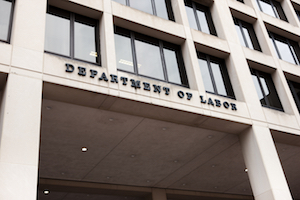 The Department of Labor has issued a temporary delay of the enforcement effective date for Prohibited Transaction Exemption 2020-02.
The Department of Labor has issued a temporary delay of the enforcement effective date for Prohibited Transaction Exemption 2020-02.
In Field Assistance Bulletin 2021-02, released Oct. 25, the DOL’s Employee Benefits Security Administration (EBSA) announced that from Dec. 21, 2021, through Jan. 31, 2022, the department will not pursue prohibited transaction claims against investment advice fiduciaries who are “working diligently, and in good faith, to comply with the Impartial Conduct Standards for transactions exempted in PTE 2020-02.”
EBSA also says it will not treat such fiduciaries as if they were violating the applicable prohibited transaction rules. Additionally, the FAB advises that the DOL will not enforce the specific documentation and disclosure requirements for rollovers in PTE 2020-02 through June 30, 2022. However, all other requirements of the exemption will be subject to full enforcement on Feb. 1, 2022.
Speaking at last week’s ASPPA Annual Conference, EBSA Acting Director Ali Khawar indicated that a delay of indeterminate length was in the works.
Background
In December 2020, the DOL under the Trump administration issued PTE 2020-02, which, among other things, permits investment advice fiduciaries to receive compensation in relation to providing fiduciary investment advice, including with respect to advice to rollover a participant’s account in a workplace retirement plan to an IRA and other similar types of rollover recommendations.
This exemption became effective Feb. 16, 2021, but the DOL provided transitional relief through Dec. 20, 2021, which relieved fiduciaries of the obligation to comply fully with many of the exemption’s conditions during that period.
Now, in FAB 2021-02, the DOL says that it understands the Dec. 20 expiration date of the current transitional relief poses practical difficulties for financial institutions. While some believe they will be ready by the deadline with fully operational systems, others believe more time is necessary and have requested additional time to build the required systems and make the transition to full compliance with the exemption, the DOL notes.
The DOL explains that these institutions have expressed specific concern that they would incur significant additional costs to distribute disclosures because Dec. 20 does not align with their regular distribution cycle for disclosures.
These institutions also have asserted that the expiration date would make it difficult to conduct the required retrospective review on a calendar-year basis. Moreover, they maintain that they face significant challenges in implementing the rollover documentation and disclosure requirements in a sufficiently automated and systematic manner by the Dec. 20 deadline. As such, these challenges and concerns may delay their ability to rely on the exemption as the department intended, the DOL explains.
“The class exemption provides meaningful protections for individual investors and we continue to emphasize the importance of compliance,” Khawar said in a statement. “Based on concerns raised, we’ve concluded that providing additional transition relief for financial institutions that are working in good faith to build systems to comply with the exemption conditions is appropriate.”
The FAB also notes that the department continues to review issues of fact, law and policy related to the exemption, and more generally, its regulation of fiduciary investment advice.
The DOL’s Spring 2021 regulatory agenda advises that the department is considering whether to revisit the fiduciary rule and whether to address the 1975 five-part test and other preexisting exemptions that were not amended by the Trump administration when it implemented PTE 2020-02. The agenda item shows that EBSA plans to issue a Notice of Proposed Rulemaking by December 2021.

